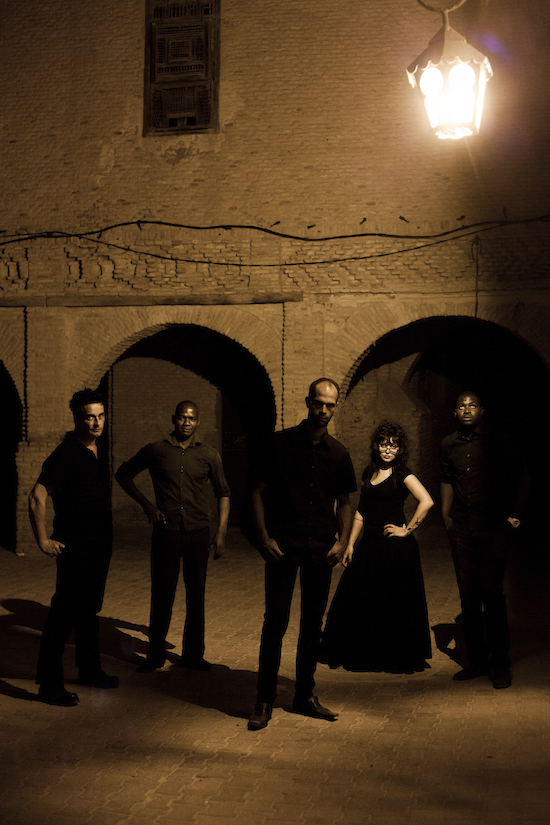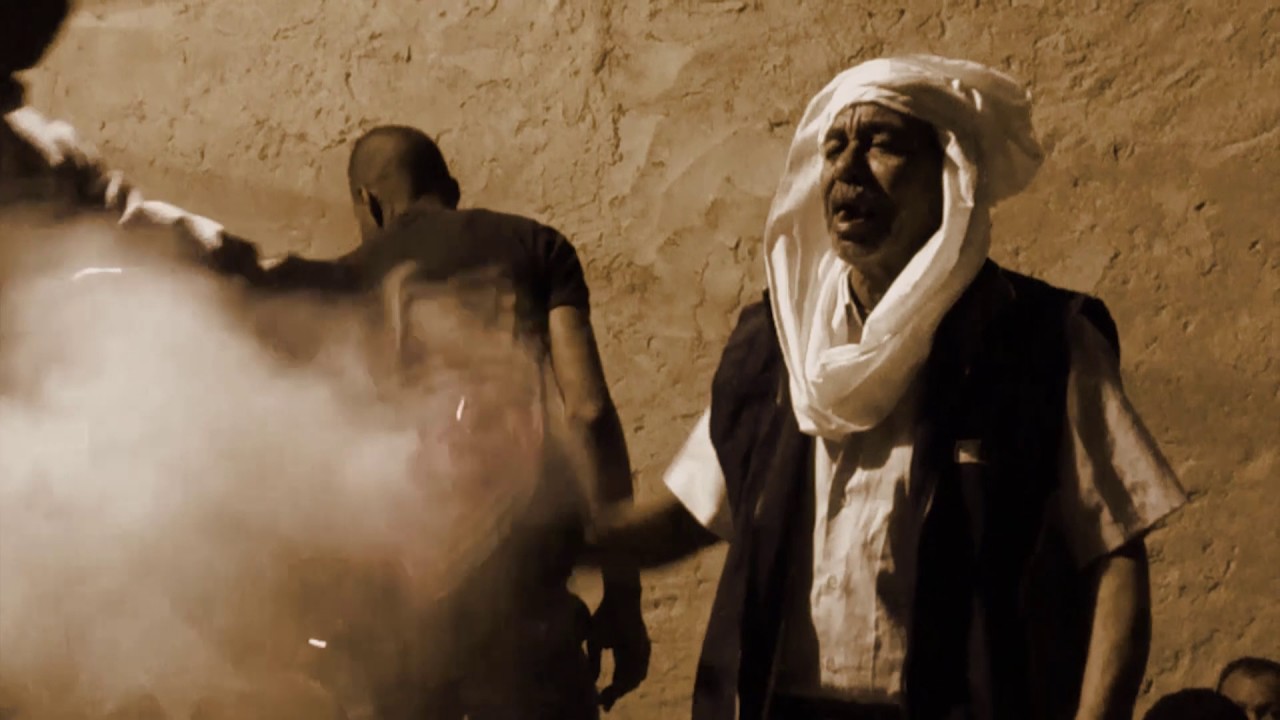Tomorrow (May 26) sees the release of Rûwâhîne, the debut Ifriqiyya Electrique album, and just ahead of its release, above we are offering you a first look at the video for album cut ‘Stombali’.
The album sees guitarist and field recordist Francois Cambuzat team up with fellow Putan Club member, bassist Gianna Greco, and a collective of Sufi trance musicians – namely Tarek Sultan, Yahia Chouchen and Youssef Ghazala – to explore Sufi traditions and the ritualism enshrined in the music.
The Ifriqiyya Electrique project was formed in the Djerid Desert in southern Tunisia, home to the Banga ritual of Sidi Marzuq. The Banga is a key annual event in the lives of many people living in southern Tunisia, seeing people accommodating the concept of a possessing spirit rather than expelling it. The Banga is also a musical tradition, built around percussion and commanding voices, with an element of ritualism central to the tradition, encouraging people to feel the music in a state of trance more than anything else.
The record capturing the musicians in action will be released via Glitterbeat and can be pre-ordered here, while you can find out more about the project here including more information on the documentary on them that has been produced alongside the album.
With a performance at Roskilde in Denmark lined up next month as well as a just-confirmed appearance at UK festival WOMAD on July 29, we caught up with Francois Cambuzat to discuss the tradition, his time spent collaborating with the musicians and living in Tunisia, and why it was important not to be tourists in the tradition.
As far as I know, you are a little bit into trance music and Tunisia, so how far away are you from traditional folk music?
Francois Cambuzat: Culturally, I am on the complete Antipodes for sure. It’s a long story. One day, I was touring in Asia and I was in Mongolia. Then I met a guy, a musician, who told me about shamanism in Shinjiang – a remote area of China. He told me there was a shamanism culture which was prohibited by death penalty in China. Back to Europe, I was thinking I had this thing when doing music and playing concerts to get high. Just be to be clear, I don’t drink and I don’t do drugs. Still, you can get into a state, let’s call it trance… Although, I prefer the word elevated. It lifts you somehow. And so, I started to read about this.
The first work I did with the shamanism was in China. Then I went back home with that music. It was also a time when I really fell in love with Tunisia. I’ve been gong there for 25 years. I live there as well. One day, I learned about this stamberi music. And so, I went into the network of that music in Tunis. Then, I discovered it was too touristy. There was no ritual. It was more like a theatre. It didn’t really play any social role. Thankfully, I had the chance to meet the ethnomusicologist and researcher Amal Fargi. She told me about the banga ritual. She offered to introduce me to it. That was three years ago. And so I went, lived with the people and saw it. For me there is a kind of global connection between music and elevation or trance, if you prefer. I can feel it everywhere. In Western music, for example. In punk rock people are pogoing. Then there’s techno. Everything we do relates to the original stuff meant to heal you. Seeing the banga was touching the essence of what music really is or can be made for.
That was exactly the first impression after listening to the song which announces the album. I thought to myself: ‘Finally, some real punk rock has emerged after a long limbo in the genre’. Your band contains traces of many various genres from sufi music to punk to industrial and more. The way you play is absolutely fierce. You feel its comes from deep within. I find your music quite unpredictable, even dangerous. How much of the album is banga-inspired?
FC: It’s banga-inspired, but in our own way. We had a lot of technical issues. Banga music doesn’t use harmonic instruments. It meant I could do whatever I wanted with harmonic chords and that was great. First of all, the inspiration came from the rituals. All the rituals we followed and filmed were real. What you could see and feel was that there were no tourists in the streets or private houses. Once you are there, you are completely gone in a maelstrom. We had to force ourselves to keep on filming and recording and watch out not to be taken. It was huge. It’s a huge ritual that happens only once a year in July.
When playing live concerts how do you manage to transmit that spirit of trance you’ve experienced onto different audiences? How do people react to this kind of music live?
FC: Until now, we’ve only played in North Africa. We have our first concert booked in Roskilde. What happened was that we played our very first concert in Nesta, where banga was born. We performed with computers and electric guitars. I’m really proud of this, because the people were getting into a trance. It means we succeeded and they were really happy. These people, they have cell phones, computers, they are modern. They belong to the normal, modern world, we can say that for sure. But, they are also really into this. After that all of the festivals contacted us. It was really strange, because we played exactly their music. We didn’t even change one rhythm, one note. The speed and the breaks… everything is exactly the same. On the one hand, it’s really their music. On the other, there are some strange things for them like a girl playing the video displayer, Yehanne. It is very unusual for them to have a woman play banga as it is very religious music. And then we have all the rest; the electric guitar which in North Africa is associated with hard rock, the music of the devil, things like that.
On the other hand, when you play banga you somehow interact with demons. Maybe it’s not that far away.
FC: That’s true. People talk about demons, but they use the word ruwahin – spirits. Good and bad spirits. Usually bad spirits you need to be healed from. Still, at the end of the concerts people were really into it, even if was a little bit shocking for them. For the North African audience the first ten minutes were a shock. After that it was complete madness. What about Europe? I don’t know. I can tell you after Roskilde.
How long do the shows usually last?
FC: Well, we followed the principle of songs as the ritual can last from four to eight hours. The concert usually lasts around an hour and a half. There are three parts. The first one is when the banga musicians are calling the people. They are usually standing in the street, playing and singing. After that they go to the place where the ritual will happen. Then they are calling the spirits and play. Afterwards, you see that the banga musicians are seated – that is the moment of possession. The speed and intensity of the music is constantly growing. It works really well for other audiences. They use the same language as in rock music. They play with speed, stop-and-go and silence.
Do you perceive yourself as a modern-day shaman when you play that music?
FC: To call myself a shaman would be too arrogant of me. I’m a part of the vector. To me it works altogether. There are three guys playing with us now and we all work to elevate others.
What are your future plans? Are you going to broaden the scope and search for new mystic music outside of North Africa? Will you keep on touring with the band?
FC: When we started doing the research, first in China and later in Tunisia, I was more like let’s keep this to ourselves. We have many other musical projects. We don’t really need to earn money or whatever. I prefer to be somehow out of the music business. Still, when we published the first track as Ifriqqiya Electrique we received offers from the biggest festivals and Glitterbeat Records called us. Five years ago, I swore to myself never to release any record again. I recorded some thirty albums. Enough. I don’t want to have a Ferrari or a house on the beach. I’m into other things. If I want to go to play in Tajikistan, I can. If Iggy Pop wants to go to Tajikistan, he can’t.
When all the offers came, Yehanne and me said: ‘Let’s accept’. All the money will go to the banga community. They are really living in deep misery. And so now, everyone is already talking about a second album. We are back in the music business. Yet, the next project of elevation music has already started. We were already in Kurdistan playing with the local musicians. We will be back there just after the concerts with Ifriqiyya. It got enormous, for sure. We have another tour coming up in October. People want to have us in China and America. We go on with it, but now it’s a matter of finding time.
The other thing is when we do this kind of project, we hate to be touristy about it. All of our realisations take years. We live with the people. Also, we always try to find a researcher to work with. The first time was with a researcher from the CRNS, the French government. The second time was with the Tunisian researcher Amal Fargi and now we have Ryszard Jankowski from America. Going there without nothing just to meet nice people doesn’t make a lot of sense. We are almost dead. We have only one life. The principle is to do what you want and do it the best you can.
Ifriqiyya Électrique play live at Milhões de Festa, Portugal, July 21 – 23



